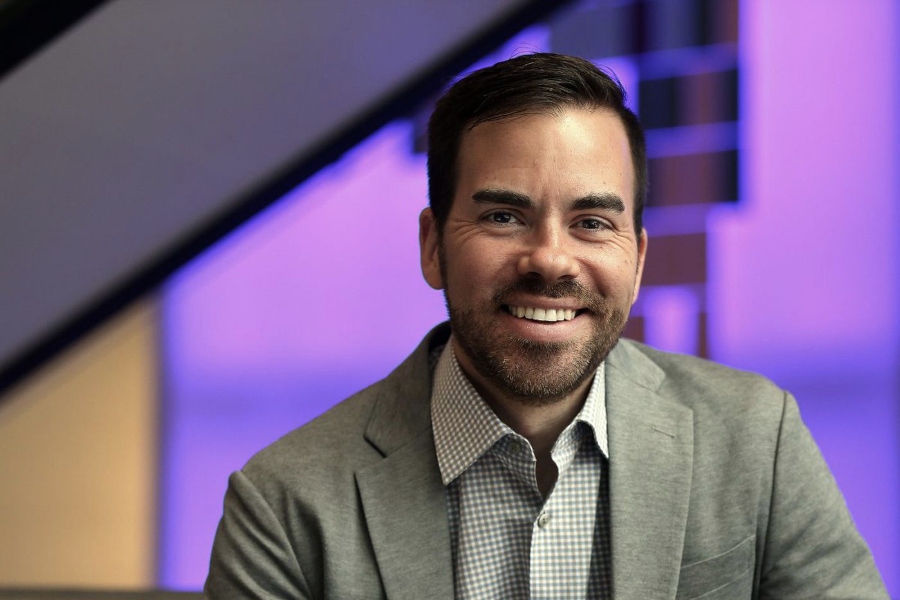NextUp: Roundtrip Is Removing Transportation Barriers From Healthcare
The local company created digital tools that make it easier for patients to commute to doctor visits. During the pandemic, they’ve also helped health workers get to their jobs.

Mark Switaj is the chief executive officer of Roundtrip Health. / Courtesy
“NextUp” is a weekly NextHealth PHL feature that highlights the local leaders, organizations and research shaping the Greater Philadelphia region’s life sciences ecosystem. Email qmuse@phillymag.com with pitches for NextUp.
Who: Mark Switaj knows patient transportation well. He spent several years working on an ambulance providing direct patient clinical care. In those years, he noticed a recurring issue: the ride to the hospital was stressing patients out.
“I saw people giving up on their healthcare, not because of the care they were going to receive, but because the actual ride to receive that care and everything associated with it distracted them and caused angst, forcing them to say to themselves, ‘I don’t know if I’m going to go to that appointment because the ride in and of itself is so laborious,’” Switaj recalled.
In 2016, Switaj teamed up with a group of area healthcare providers, including nurses, doctors, social workers, hospitals and transportation companies to examine their process for arranging transportation for patients. Using the design thinking methodology, Switaj spent the rest of 2016 developing iterations of a technology platform that could address the major pain points in the healthcare transportation process. In 2017, Switaj, finance expert Angela Damiano, and techie Ankit Mathur co-founded Roundtrip, an on-demand medical transportation company that provides non-emergency medical transportation for healthcare providers and patients.
They’ve since grown from a team of three to over 40 employees who operate from the company’s headquarters at 441 N. 5th Street in the Spring Garden section of the city.
What: The American Hospital Association estimates 3.6 million people in the U.S. miss or delay medical care each year because of issues related to transportation. Those issues range from not having a vehicle or not being able to afford to pay for a ride, to being unable to find a ride that meets special needs.
Roundtrip provides online and mobile tools that enable healthcare professionals to schedule, dispatch and monitor non-emergency transportation for patients. Health systems, healthcare providers, paratransit companies and health plans can use Roundtrip’s customized online marketplace and digital tools to connect patients with the type of ride they need, from basic rideshares and medical sedans to wheelchair vans and stretcher vehicles. For a visually impaired patient, for example, Roundtrip’s technology will transcribe its ride alert text messages into automated voice calls or messages that can be viewed on specialized computer screens.
“We know transportation is one of the leading reasons people miss or delay their healthcare. It’s one of the major social determinants of health. So, we wanted to be able to serve any person in a population,” Switaj explained. “Whether it’s somebody like me that can walk and get a ride-share or someone who can’t walk, is in a wheelchair, or someone who might have substance abuse or behavioral health considerations, or even someone who is visually impaired, for who we know certain ride types wouldn’t meet their needs.”
Among other health outcomes, Roundtrip’s services aim to reduce patient appointment no-shows by facilitating constant contact between the driver and patient using automated ride reminders as automated texts or voice calls, both available in multiple languages.
When: In 2016, when the company was still an early-stage start-up, Roundtrip was one of five finalists selected from a group of over 120 companies who submitted to The Pitch, a competition that sought to identify the most innovative business ideas in the region.
In July 2020, Roundtrip announced a $4 million capital raise with investments by Motley Fool Ventures and ZOLL Medical Corporation. To date, the company has raised a total of $10.5 million with previous investments from Johns Hopkins University and Ben Franklin Technology Partners, among others.
What it means: When COVID-19 began spreading across the U.S. in early March, like many companies, Switaj said Roundtrip began to feel the pressure of change but not in ways he’d anticipated. With rising uncertainty about coronavirus, many healthcare providers stopped offering face-to-face appointments and shifted to telehealth, leaving little need for transportation for patients.
“I knew it would impact us, but I didn’t expect that outpatient transit would basically turn off,” Switaj said. “We just did not see that coming, but most of the time when people go to get healthcare it’s through outpatient appointments.”
Roundtrip’s technology team began looking for additional use cases for the company’s technology and quickly realized they could pivot to transporting caregivers instead of patients. Caregivers (nurses, doctors and other healthcare providers) still needed to get to and from the places where they provide care but putting them on public transit or in a shared ride might cause them to be exposed to the virus.
According to Switaj, many of Roundtrip’s partners, including hospitals and health systems in 40 states, began using the company’s technology to arrange safe rides for their employees. At their partners’ requests, Roundtrip also made special arrangements to be able to safely transport COVID-19 positive patients to healthcare facilities without exposing others to the virus.
“We saw outpatient shift downward and, at the same time, we started to see employee transport shifting upward; hundreds and hundreds of caregivers were being transported using our tech,” he said.
“When facilities asked if they could order rides for COVID diagnosed patients through our technology, we had to make that possible. So, now we’re actively transporting suspected and confirmed COVID-19 diagnosed individuals as well as transporting folks that are confirmed negative COVID-19 patients and keeping that data separate.”
Why it matters now: Because the company tracks its transportation data, Roundtrip can actively trace COVID-19 diagnosed individuals’ movements to and from their healthcare appointments. This information could be critical to COVID-19 contact tracing efforts in the future.
In addition, the company’s transit data may be able to help the healthcare industry identify early indicators of the impacts the virus has had on healthcare trends. According to Switaj, the company’s data already shows indications that healthcare transports for mental or behavioral health-related visits have decreased and visits related to substance abuse, rehab and primary care have increased most during the pandemic. While it’s still too soon to make correlations, the company’s data will be useful in understanding how the pandemic has shifted healthcare needs.
“With any early-stage company you’re also growing and evolving your technology. In the beginning, we focused largely on moving patients,” Switaj said.
“As we’ve grown as a company, we’ve become more interested in the power of the insight associated with rides. And what we’ve found is that by integrating into electronic medical record systems and overlaying transportation — meaning we have deep demographic information with deep medical and diagnosis information relative to the person that we’re giving rides to — we’re now able to learn more about what has happened to their health outcome or the reasons their need for transportation has shifted over time.”
In the future, Switaj hopes transportation will be prescribed much like any medication would be and that it will be included as a staple of a patient’s care plan, based on their individual health and social needs.
“For somebody that is bed-confined or is in a wheelchair and is going to dialysis three times a week, that individual also has complications when it comes to getting access to healthy food, staying active in the community and even getting to work,” he explained.
“People in specialized populations are at the greatest risk of getting sicker and needing an ER visit. If we’re able to understand those populations and give them access to transportation we might be able to improve overall health and wellbeing. We call it transportation dosage. That’s where we’re going. We want to improve health outcomes by disease state through transportation.”


